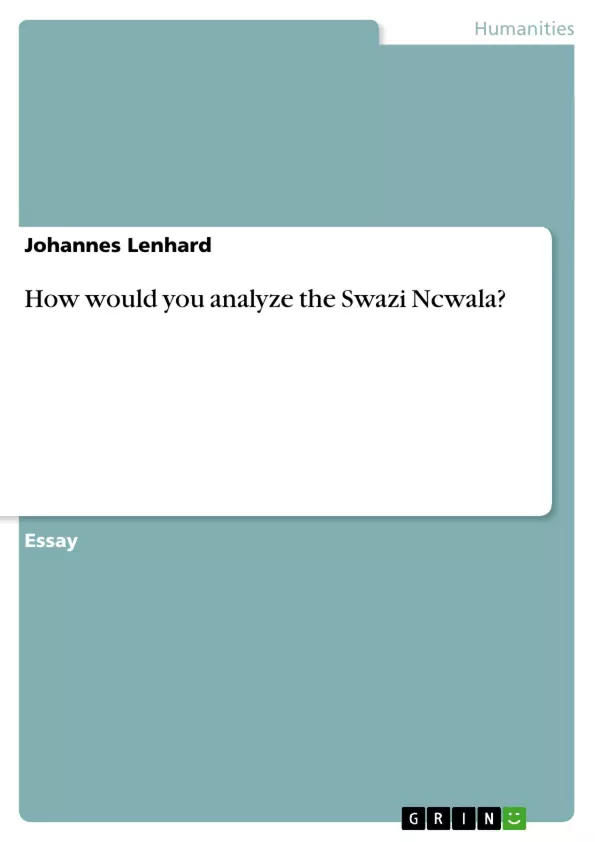Kuper’s (1944) original account of the ritual of Incwala in the Swazi territoriy in Southern Africa has spurred an immense literature over the past seventy years. From sociological-functionalist accounts focusing on the Incwala as a ritual of ‘internal rebellion’ (Gluckman, 1953,1960) over a symbolist focus on the metaphorical power of the King’s separation (Beidelman, 1966) to the historical embedding of different forms of the Incwala (Kuper, 1972; Lincoln 1987), no singular interpretation seems adequate on its own. Adding a further layer using a more ‘practice oriented’ and individual analysis of rituals (La Fontaine, 1985; Bloch, 1991), I try to accomplish an even more complicated and multi-faceted interpretation claiming that no single line of thought can represent the complexity of this ritual in its various historical forms.
Inhaltsverzeichnis (Table of Contents)
- Kuper's (1944) Original Account of the Incwala
- Gluckman's (1953) Focus on Rebellion
- Beidelman's (1966) Symbolic Interpretation
- Kuper's (1972) and Lincoln's (1987) Historical Embeddings
- La Fontaine's (1985) Ritual as Extended Drama
- Bloch's (1991) Transformative Quality of Ritual
Zielsetzung und Themenschwerpunkte (Objectives and Key Themes)
This text aims to provide a multifaceted interpretation of the Swazi Incwala ritual, moving beyond simplistic, functionalist analyses and incorporating historical, symbolic, and individual perspectives. The main objectives are to:- Explore the evolution of interpretations of the Incwala, from early sociological accounts to more nuanced perspectives.
- Examine the role of symbolism in the ritual and its connection to Swazi cosmology.
- Analyze the historical context of the Incwala and its transformation under colonial influence.
- Highlight the importance of ritual practice and embodiment in understanding the meaning of the Incwala.
- Consider individual perspectives and experiences within the ritual framework.
Zusammenfassung der Kapitel (Chapter Summaries)
- Kuper's (1944) Original Account of the Incwala: This chapter introduces Kuper's original ethnographic description of the Incwala ritual, focusing on its annual celebration, two-part structure, and the symbolic significance of the King's role in the ritual. Kuper's account highlights the "nationalizing" value of the Incwala and its role in uniting the Swazi people under their king.
- Gluckman's (1953) Focus on Rebellion: This chapter examines Gluckman's interpretation of the Incwala as a ritual of "internal rebellion." Gluckman emphasizes the presence of conflict and antagonism within the ritual, suggesting that it serves to release societal tensions and reaffirm the established order. Gluckman's analysis draws on the Aristotelian concept of "catharsis," where ritualized rebellion ultimately leads to a purified social order.
- Beidelman's (1966) Symbolic Interpretation: This chapter explores Beidelman's symbolic interpretation of the Incwala, moving beyond the sociological focus of Gluckman. Beidelman emphasizes the importance of Swazi cosmology and the symbolic vocabulary used in the ritual. He argues that the Incwala involves a period of separation and reunification, symbolized by the King's isolation and subsequent reintegration into society. Beidelman criticizes Gluckman's functionalist analysis, arguing for a more nuanced understanding of the symbolic meanings embedded in ritual practice.
- Kuper's (1972) and Lincoln's (1987) Historical Embeddings: This chapter examines the work of Kuper and Lincoln, who both add a historical dimension to the interpretation of the Incwala. Kuper traces the evolution of the ritual from pre-colonial times to independence, highlighting how colonial pressure transformed the Incwala into a symbol of Swazi resistance. Lincoln builds upon Kuper's work, focusing on the colonial period and interpreting the Incwala as a tool of resistance against British domination. Both scholars argue that the meaning of the Incwala is deeply intertwined with its historical context.
- La Fontaine's (1985) Ritual as Extended Drama: This chapter introduces La Fontaine's interpretation of rituals as "extended dramas," drawing parallels between ritual and theatrical performance. La Fontaine emphasizes the artificiality of ritual, its use of deception, and its role in generating sociality through collective participation. She argues that the Incwala, particularly during the colonial period, exemplifies this concept of ritual as drama, with participants enacting symbolic roles and expressing social tensions through their actions.
Schlüsselwörter (Keywords)
The key terms and concepts central to the text include the Swazi Incwala ritual, ritual practice, symbolism, cosmology, historical context, colonialism, resistance, social unity, individual agency, and the concept of ritual as an extended drama. The text explores various interpretations of the Incwala, highlighting the interplay between social function, symbolic meaning, and historical contingency.Frequently Asked Questions
What is the Swazi Incwala?
The Incwala is the most important annual ritual in Eswatini (formerly Swaziland), often described as a kingship ritual or a first-fruits ceremony that unites the nation.
How did Max Gluckman interpret the Incwala?
Gluckman famously interpreted the ritual as a "ritual of rebellion," where social tensions and conflicts are acted out to ultimately strengthen the social order and the King's authority.
What was Beidelman's critique of Gluckman?
Beidelman focused on symbolism and Swazi cosmology, arguing that the ritual is more about the King's separation and the mystical power of kingship than just a social safety valve for rebellion.
How did colonialism affect the Incwala ritual?
Historical analyses show that the Incwala was transformed under colonial pressure into a powerful symbol of Swazi national identity and resistance against British domination.
What is meant by "ritual as an extended drama"?
This perspective, influenced by La Fontaine, views the ritual as a theatrical performance where social roles and tensions are enacted through collective participation and symbolic drama.
- Quote paper
- Johannes Lenhard (Author), 2013, How would you analyze the Swazi Ncwala?, Munich, GRIN Verlag, https://www.grin.com/document/230430



